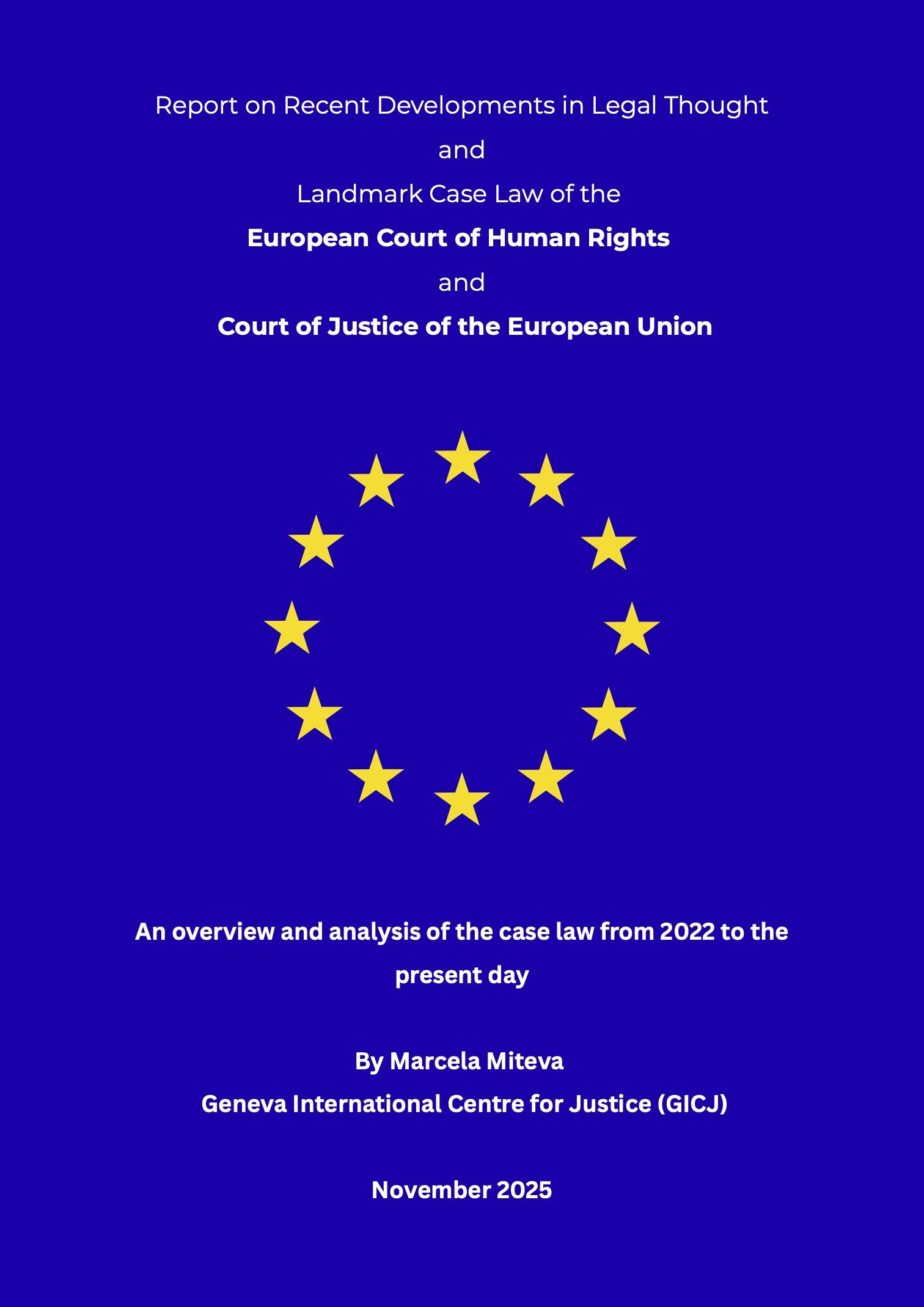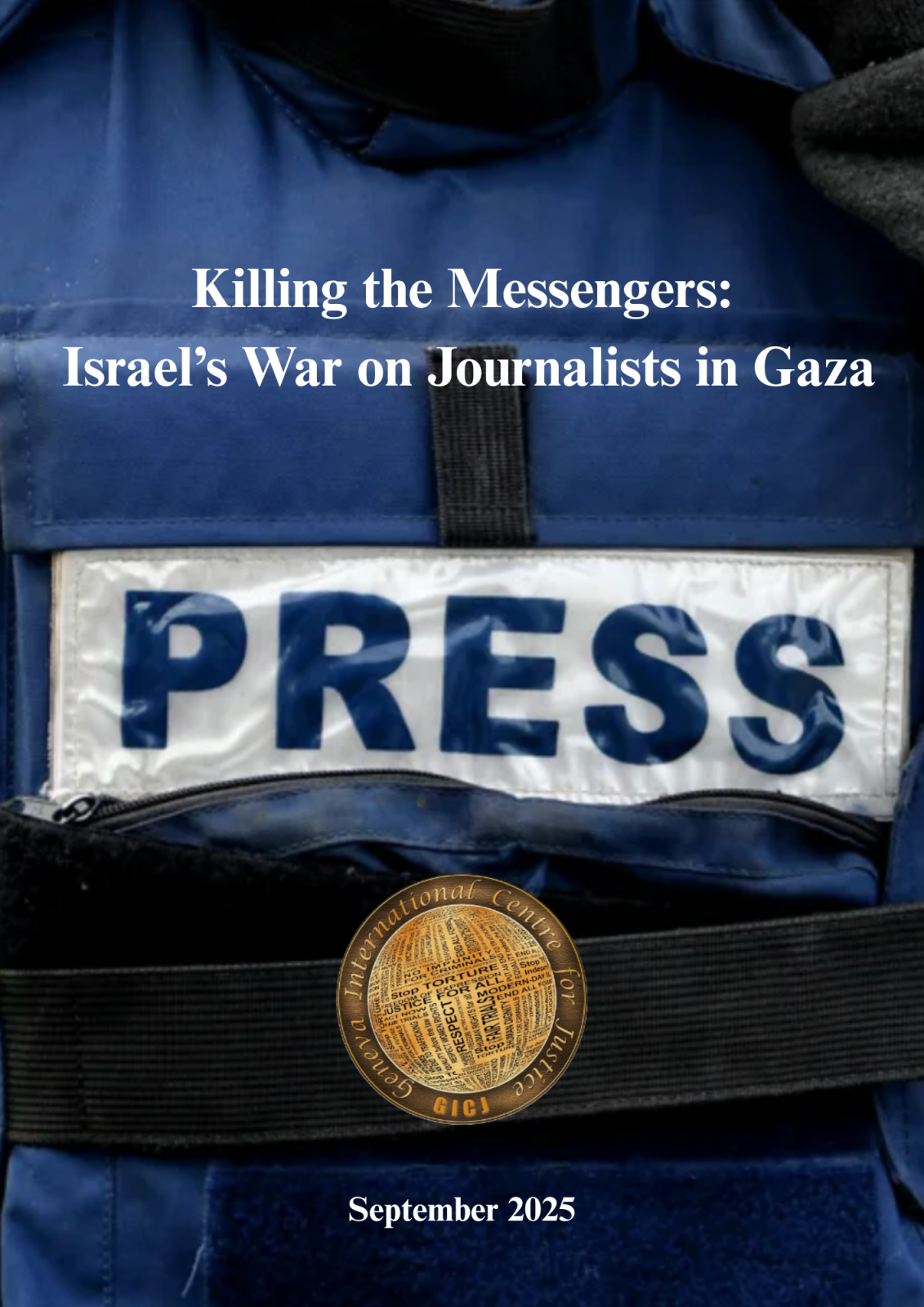07.12.2018
Contents:
Human Rights Day is a commemoration of the date on which the UN General Assembly endorsed the Universal Declaration of Human Rights (UDHR) in 1948. 2018 marks the 70th anniversary of this landmark document, the first of its kind to declare a set of rights held by each human being on the planet regardless of nationality, race, gender, belief or any other distinction. It put forth an ideal that recognizes us all as part of one human family with each of us deserving of the same respect and dignity regardless of our location or background.
The UDHR was developed in the aftermath of the devastation and atrocities of World War II. It was intended to inspire peaceful relations among the countries of the world and to promote respect by governments for the rights of their own populations. After 70 years, now is a good time to reflect on how we have done as a planet to respect and promote human rights. What has been the impact of the Declaration and what needs to be done?

On the positive side, the UDHR has inspired a series of human rights treaties that have established obligations on the countries of the world to help ensure that the broad ideals of the Declaration are, indeed, respected for all individuals and peoples. In particular, the International Covenant on Civil and Political Rights and the International Covenant on Economic, Social and Cultural Rights provide more detailed elaboration on the broad rights described in the Declaration. Unfortunately, while they are widely accepted, neither convention has been adopted by all countries. Numerous countries continue to hold back on ratifying one or both conventions thus preventing our universal human rights from enjoying universal application. Even in countries that have ratified the treaties, problems persist in the consistent enforcement of human rights by governments around the world. There always seem to be excuses for making exceptions to human rights. From armed conflict and natural disasters to ingrained power structures and simple political expediency, the situations in which human rights are violated are many and varied – and violations occur all too frequently.
Today, Geneva International Centre for Justice (GICJ) recalls many of the situations in which we have failed to protect human rights in places across the globe. As we celebrate the truly historic accomplishment of the Universal Declaration of Human Rights on its 70th anniversary, we want to remember that the struggle for human rights did not end with the UDHR and that there continue to be many victims of human rights abuses today. We believe that by being informed we are better prepared to address the scope of the problems we face as a human society and can better pursue justice for all human rights violations and the ultimate goal of universal respect for human rights.
TOPICS OF CONCERN
Civil Society
Civil society actors have been actively engaged with the United Nations since its inception. Civil society has been critical in the drafting of the UN Charter and with strengthening and promoting the three pillars of the UN Charter: peace and security, human rights, and development. Non-governmental organisations (NGOs) engage closely with the United Nations via consultative status with the Economic and Social Council (ECOSOC) based on Article 71 of the UN Charter. Additionally, the Vienna Declaration and Programme of Action states:
| II.67. Special emphasis should be given to measures to assist in the strengthening and building of institutions relating to human rights, strengthening of a pluralistic civil society. |
While it is well acknowledged that civil society’s role is essential to the UN, there has been in recent years a ‘shrinking’ of civil society space globally and at the United Nations including the Human Rights Council (HRC). NGO registration to the HRC contains several barriers, especially for people in vulnerable situations,  such as those without reliable internet access. Additionally, physical space within the UN chambers and the number of accredited persons to attend and participate in interactive side-events has significantly reduced.
such as those without reliable internet access. Additionally, physical space within the UN chambers and the number of accredited persons to attend and participate in interactive side-events has significantly reduced.
The Declaration on Human Rights Defenders marks its 20th Anniversary this year in 2018. On a global level, human rights defenders and journalists continue to be the target of repression by states or private groups. In numerous cases human rights defenders suffered reprisals and other acts of violence such as sexual harassment against women human rights defenders. Journalists are also targeted for spreading information especially if that information is against or exposes violations by oppressive leaders, regimes, or organisations. In the Report by the Special Rapporteur on the situation of human rights defenders, the Special Rapporteur noted that human rights defenders “are increasingly subject to attacks by States and business-enterprises.”
|
“The determination and integrity of civil society actors working for human rights bring me, and perhaps bring to you, a sense of humility, a feeling of a great and powerful debt being owed, and the will to continue working for the equal and inalienable dignity and rights of every human being.” Zeid Ra’ad Al-Hussein |
In recognition of the important role of civil society, GICJ calls on the UN and all states to support constructive dialogue between civil society and other stakeholders and to ensure protective space and security for all defenders of human rights.
Climate Change
The Intergovernmental Panel on Climate Change in its 5th Assessment Report (2014) confirmed that climate change is, without a doubt, real and man-made greenhouse gas emissions are its principle cause. Climate change is a global issue that is becoming a serious and urgent reality especially for certain populations. The frequency of extreme weather events and natural disasters, rising sea-levels, floods, heat waves, desertification, droughts, water shortages, and the spread of vector-borne and tropical diseases and other such adverse impacts of climate change is meant to increase. Those already in vulnerable situations are subject to higher risks and human rights harms. Moreover, the adverse impacts will be disproportionate and will hit hardest people and communities in disadvantageous situations owing to their “geography, poverty level, gender, age, indigenous or minority status, national or social origin, birth or other status and disability.”
The Pacific region is already dealing with rising sea-levels that have had adverse effects on its communities. Kiribati, Micronesia, the Solomon Islands, the Maldives, and Vanuatu are the worst affected countries. Residents of the Republic of Kiribati, an island republic in the Central Pacific that sits on average six feet above sea-level, have already started migrating due to the rising sea-levels that are causing the island to disappear. Many communities and families have already lost their homes and livelihoods and those who migrate must undertake the hardships of securing and settling into different regions and ways of living.
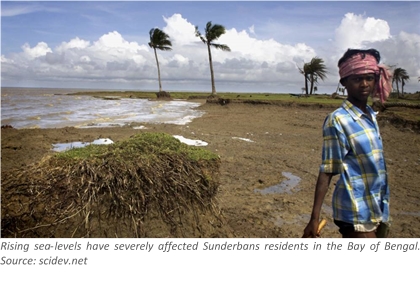 In eastern Africa approximately 12 million people have been adversely affected by climate change. Poor rains, unpredictable weather, and increased temperatures have led to unstable crop production and, as a consequence, food shortage. Climate change and variability have upset food stability and food security strategies especially for poor people and communities – and in some instances has even led to violent conflicts. On a larger and more global scale, fisheries in numerous regions are adversely affected as warming ocean temperatures force certain species to migrate to different regions. The loss of fishing industries seriously affects food security for communities that rely on such industries.
In eastern Africa approximately 12 million people have been adversely affected by climate change. Poor rains, unpredictable weather, and increased temperatures have led to unstable crop production and, as a consequence, food shortage. Climate change and variability have upset food stability and food security strategies especially for poor people and communities – and in some instances has even led to violent conflicts. On a larger and more global scale, fisheries in numerous regions are adversely affected as warming ocean temperatures force certain species to migrate to different regions. The loss of fishing industries seriously affects food security for communities that rely on such industries.
Unfortunately, government responses in nearly all situations and regions has been slow and less than adequate. Without properly accounting for impacts of climate change many challenges have already arisen and many more will continue to surface. Most of the change is coming from civil society, especially the youth and indigenous peoples. On 4 December, ahead of the Climate Conference, UN Secretary-General António Guterres said, “Our younger generations will have to help drive, and complete, the work we start today. We need to harness their energy, invention and political power to raise climate ambition.”
GICJ is most concerned with vulnerable persons and communities and those in disadvantageous situations. Additionally, interrelated issues such as migration must be acknowledged and observed. To this end GICJ advocates for a rights-based approach to climate change especially when designing and drafting global policies and measures that address climate change.
Migration
Migration is a fact of life. From time immemorial, people have moved in search of new opportunities and better lives. Climate change, demographics, instability, growing inequalities and aspirations for a better life, as well as unmet needs in labour markets, mean it is here to stay. Migration is a phenomenon that must be understood and managed rather than prohibited and criminalised. Today, there are around 258 million migrants, i.e., people residing in a country other than their country of birth, which represents 3.4% of the world’s total population. Out of this total number, 150.3 million are migrant workers, 4.8 million are international students, 68.5 million are internally displaced persons (IDPs) due to persecution, conflict, generalized violence, human rights violations, or other reasons, 25.4 million are registered refugees, and 50 million are irregular migrants. In addition, 25 million have been victims of forced labour and 18.8 million have been displaced by environmental disasters.
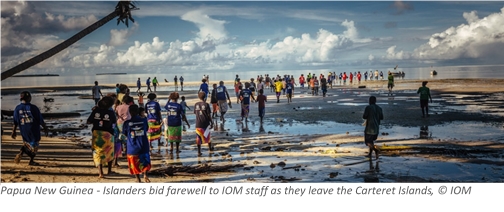
On 19 September 2016, heads of state and government came together at the UN General Assembly to discuss topics related to migration and refugees and adopted the New York Declaration for Refugees and Migrants, which recognized the need for a comprehensive approach to migration. By adopting the Declaration, UN Member States agreed to cooperate on the elaboration of a Global Compact for Safe, Orderly and Regular Migration (GCM) and a Global Compact on Refugees (GCR). The GCM is expected to be adopted at an intergovernmental conference on international migration on 10-11 December 2018 in Marrakech, Morocco. The GCM is the first-ever UN global agreement on a common approach to international migration in all its dimensions. The global compact is non-legally binding. It is grounded in values of state sovereignty, responsibility-sharing, non-discrimination, and human rights, and recognizes that a cooperative approach is needed to optimize the overall benefits of migration, while addressing its risks and challenges for individuals and communities in countries of origin, transit and destination. Yet, several countries are opposing its adoption in this very last moment, expressing reservations to the text (ex. United States, Australia, Israel, Poland, Austria, Hungary, Italy, the Czech Republic, Bulgaria, Switzerland, Estonia, Slovakia). Following heated debates in their respective parliaments, many countries have refused to even participate to the conference where they could submit their views on the GCM.

Geneva International Centre for Justice calls on all UN Member States to adopt the Global Compact for Safe, Orderly and Regular Migration at a conference which happens to take place partially during the annual celebration of Human Rights Day. It is necessary to recognise our collective commitment to improving cooperation on international migration which is a source of prosperity, innovation and sustainable development in our globalized world. A comprehensive approach is needed to optimize the overall benefits of migration, while addressing risks and challenges for individuals and communities in countries of origin, transit and destination. No country can address the challenges and opportunities of this global phenomenon on its own. GICJ reiterates the need for shared responsibility and cooperation in the field of migration.
Modern Slavery
Even though the outright ownership of persons is illegal across the globe, there are many and widespread modern forms of slavery that subject millions of men, women, and children to situations of exploitation that the person cannot leave because the exploiter takes advantage of a power differential or uses some form or combination of violence, coercion, or deception. The most common situations include forced labour, forced early/child marriage, trafficking, and coercion or trafficking of children into armed conflict. Sexual exploitation can also be a component of these situations.
Forced labour has a long history in the form of bonded labour or debt bondage where an individual’s services are used for the repayment of a debt. In addition to this traditional form of forced labour, there are now more contemporary practices such as when migrant workers are trafficked for economic exploitation in domestic servitude, construction, manufacturing, agriculture and prostitution. This year, the UN Special Rapporteur on Contemporary Forms of Slavery reported on how even people who voluntarily migrate for work can become trapped into slavery-like conditions. This is particularly the case for women who migrate to undertake paid domestic work due to a variety of intersecting factors. 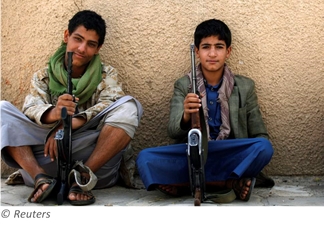 Sadly, approximately 4.3 million children are part of the world’s forced labour victims. Of these, about 1 million children are victims of commercial sexual exploitation, and nearly 300,000 children are in forced labour imposed by state authorities.
Sadly, approximately 4.3 million children are part of the world’s forced labour victims. Of these, about 1 million children are victims of commercial sexual exploitation, and nearly 300,000 children are in forced labour imposed by state authorities.
The use of children in armed conflict has become a high-profile issue in recent years due to a number of local and regional conflicts where children have been recruited. When children participate in armed conflict it is detrimental to both their physical and psychological well-being. The First Optional Protocol to the Convention on the Rights of the Child is more specific in declaring that children, defined as persons under the age of 18, should not be forcibly recruited into a country’s armed forces. Children may voluntary serve in national armed forces but should not take direct part in hostilities. However, children should never, under any circumstances, be recruited or used in hostilities by an armed group that is not part of a country’s armed forces.
Human trafficking delivers millions of people into conditions of modern slavery every year. Traffickers regularly engage in the involuntary detention, kidnapping, and smuggling of people. In the process, they subject victims to inhuman conditions, physical violence, and even organ harvesting. GICJ calls on the international community, including states, UN bodies, human rights institutions and civil society, to address the root causes underlying modern slavery and pursue the goal of truly abolishing such practices.
Racism and Racial Discrimination
Racism, racial discrimination, intolerance, hatred and xenophobia continue to rise globally. Especially concerning are the leaders who use modern communications to swiftly spread their messages of hate and fear against particular groups and minorities. There is also a worrying rising trend of blaming racial minorities, especially if they are refugees or migrants, for crimes and social ills.
GICJ notes with deep regret that still today, political parties and people in positions of power continue to spread misinformation, disinformation and negative and inaccurate portrayal of migrants, minorities, and people with different ethnic or cultural backgrounds. Moreover, information used to create negative stereotypes or to scapegoat certain groups of people is often based on unverified or distorted stories, hate speech, or untruths. It is especially troubling that discriminatory laws and policies are being put in place based on racism, racial intolerance and hatred. As highlighted in the DDPA, GICJ strongly believes that racism, racial discrimination, xenophobia and related intolerance are the root causes of social and economic inequalities, as well as internal and international conflicts, and only serve to “divide communities, and societies, and humanity against itself.”
In her recent report to the 73rd Session of the UN General Assembly in September 2018, the Special Rapporteur on contemporary forms of racism, racial discrimination, xenophobia and related intolerance, recognized the threat of nationalist populism to racial equality. The Special Rapporteur noted that nationalist populism is increasing in popularity and “advances exclusionary or repressive practices and policies that harm individuals or groups on the basis of their race, ethnicity, national origin and religion, in combination with gender, sexual orientation, disability status, migratory status or other related social categories.”
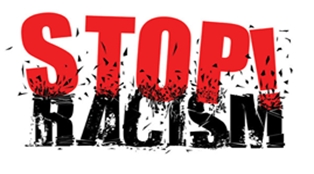 The Durban Declaration and Program of Action (DDPA) and the Outcome Document of the Durban Review Conference (2009) provide comprehensive international frameworks that address the evils of racism and put victims at the centre of anti-racism efforts. These documents promote action plans, education, and other measures for the international community to prevent, combat, and eradicate racism, racial discrimination, xenophobia and related intolerance and also seriously addresses root cause issues.
The Durban Declaration and Program of Action (DDPA) and the Outcome Document of the Durban Review Conference (2009) provide comprehensive international frameworks that address the evils of racism and put victims at the centre of anti-racism efforts. These documents promote action plans, education, and other measures for the international community to prevent, combat, and eradicate racism, racial discrimination, xenophobia and related intolerance and also seriously addresses root cause issues.
In light of this, Geneva International Centre for Justice strongly urges and encourages the international community to adopt the DDPA and its Action Plans toward combatting, ending, and preventing the scourge of racism and other forms of hatred. To this end, data collection, accurate historical education, human rights education, and solidarity must be effectively enhanced.
U.S. Withdrawal from Human Rights Council
On 19 June 2018, the United States announced that it would withdraw from the UN Human Rights Council by giving up its current seat as a member and not participating in future sessions. This decision was a setback for the world’s human rights system and a black mark on the U.S.’s standing in the world. The protection and promotion of human rights is a collective responsibility for the world community. The United States has a unique role as a superpower, a permanent member of the UN Security Council, and the largest funder of the UN System. As an integral part of its unique position, the United States also has a high level of responsibility to help ensure the health and integrity of the UN’s multilateral institutions, including those addressing human rights. In spite of claiming that it will continue to champion human rights on its own, the United States’ credibility with regard to human rights is severely compromised as long as it attempts to operate outside the international system that applies to all other UN members – a system the United States helped create in the aftermath of the Second World War.
The United States must practice what it preaches. Despite assuming the self-proclaimed title of “the champion of human rights,” human rights seem to be missing in much of American foreign and domestic policy. The U.S. remains the only UN member country not to ratify the Convention on the Rights of the Child, and the U.S. has failed to even sign many other human rights treaties and conventions. Internationally, the U.S. has violated the human rights of large populations in countries such as Vietnam, Iraq and Afghanistan through its invasions and other uses of armed force. Even domestically, the U.S. continues to struggle with discrimination against the rights of various groups of its own citizens.
Occasionally the U.S. makes self-corrections, like the reversal of the abhorrent policy of separating children from immigrant parents. However, the example of immigrant families merely demonstrates that actions within the U.S. have impacts on the human rights of people from other countries. The United States cannot avoid the fact that it is part of a large international community, and an important member at that. It must undertake its international responsibilities as part of multilateral forums, including those dealing with human rights such as the Human Rights Council. Any other decision by the United States does not reflect the human rights values it espouses and constitutes a setback for the work of hundreds of human rights experts, activists and defenders who look to the Human Rights Council to lead the global human rights agenda.
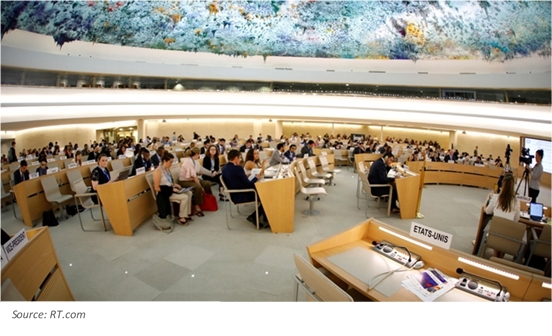
GICJ believes that if the United States is really seeking to play a leading role in human rights, it should strive to do so from inside, rather than away from, the primary international human rights mechanism.
COUNTRIES OF CONCERN
Burundi
The Imbonerakure are the Youth Wing of the current ruling party, National Council for the Defence of Democracy-Forces for Defence and Democracy (Conseil national pour la défense de la démocratie-Forces de défense et de la démocratie CNDD-FDD). They are said to consist of demobilized former rebels and members are aged between 18 and 39 years old. They have been engaged in political and other activities across Burundi, but reports indicate that in recent years (at least since 2012) they have been engaged in various and numerous human rights violations and other abuses. Such acts include extrajudicial killings, banditry, hate speech and incitement to violence, and political killings among others. During Burundi’s third Universal Periodic Review (UPR), the Imbonerakure was highlighted as one of the groups that committed most of the human rights violations in Burundi, including “summary executions, enforced disappearances, torture and the alleged sexual violence.”
A constitutional referendum was held in Burundi on 17 May 2018 regarding the extension of the presidential term from five to seven years. In essence this would allow the current president, Pierre Nkurunziza, to rule for another 14 years after his current term ends in 2010. However, numerous instances of violence and acts of intimidation toward opposition supporters were reported in early 2018. On May 3rd, for example, an elected official in one region claimed that activists were prevented from attending a meeting while, in another region, members of the opposition party had their IDs and registration papers taken. 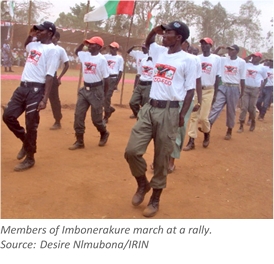 The following day, vendors in Makamba Province claimed that they were forced to close down their malls and shops and to attend CNDD-FDD meetings and campaigns. In that same month, supporters of the opposition party accused Imbonerakure of acts of intimidation including death threats and violent attacks. These attacks by Imbonerakure violate civilians’ right to freedom of opinion and expression and their freedom of peaceful assembly as guaranteed and protected in Articles 19 and 20 of the Universal Declaration of Human Rights.
The following day, vendors in Makamba Province claimed that they were forced to close down their malls and shops and to attend CNDD-FDD meetings and campaigns. In that same month, supporters of the opposition party accused Imbonerakure of acts of intimidation including death threats and violent attacks. These attacks by Imbonerakure violate civilians’ right to freedom of opinion and expression and their freedom of peaceful assembly as guaranteed and protected in Articles 19 and 20 of the Universal Declaration of Human Rights.
Geneva International Centre for Justice strongly condemns the abuses and violations committed by Imbonerakure, which include forced recruitment, forced association, sexual violence, hate speech and incitement of hatred and violence against those opposed to the ruling party. Furthermore, concerning arbitrary arrests and detention, it should be noted that Imbonerakure is not legally authorised to make any arrests. These perpetrators must be held accountable by the government of Burundi, which must also bear responsibility for the violations and abuses committed by Imbonerakure. To this end, GICJ calls on the government of Burundi to:
• Respect and protect the right to freedom of expression, association, and peaceful assembly;
• Investigate the rights violations committed by the Imbonerakure, bring the perpetrators to justice and put an end to all acts of intimidation and threats; and
• Provide adequate human rights training and education to all Youth Groups, especially the Imbonerakure.
Central African Republic
In the Central African Republic (CAR), outbreaks of violence and clashes resurfaced in July 2017 that included grave human rights violations that deeply impacted the civilian population. Some of the major violations include murder, torture, inhuman and degrading treatment, sexual violence, 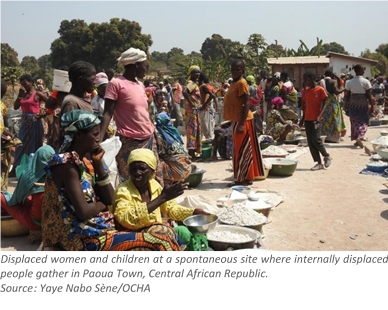 abduction, deprivation of liberty and arbitrary arrest, extortion and looting, military recruitment and use of children, denial of humanitarian aid, and attacks on schools, health centres and places of worship. Since then, many innocent civilians have died and many more have been wounded. In addition, conflict has escalated due to the increase of hate speech and incitement to violence that has also led to discrimination and social stigmatization. To make matters worse, members of armed groups have been handing down mob justice in cruel and inhuman forms including degrading treatment inflicted on elderly and defenceless persons.
abduction, deprivation of liberty and arbitrary arrest, extortion and looting, military recruitment and use of children, denial of humanitarian aid, and attacks on schools, health centres and places of worship. Since then, many innocent civilians have died and many more have been wounded. In addition, conflict has escalated due to the increase of hate speech and incitement to violence that has also led to discrimination and social stigmatization. To make matters worse, members of armed groups have been handing down mob justice in cruel and inhuman forms including degrading treatment inflicted on elderly and defenceless persons.
To combat and prevent such atrocities there have been numerous local peace initiatives that are in support of the African Initiative for Peace and Reconciliation. Additionally, the government of the CAR established a Special Criminal Court (SCC) in 2015 to bring justice to the victims of horrendous crimes committed during the conflict since 2003. The SCC was very much welcomed by the international community and received broad commendation for its establishment, especially during CAR’s third Universal Periodic Review of rights review. However, it will require significant financial and technical support for it to function efficiently and effectively. Thus, GICJ strongly encourages the international community to provide financial and technical assistant to support CAR’s SCC to bring human rights violators to account and to serve justice toward the victims.
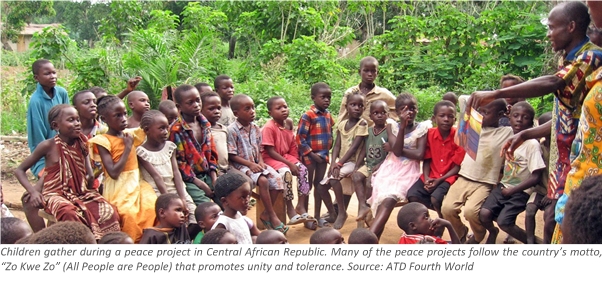
When it comes to local peace initiatives, however, much of the population, especially women, have not been involved. It is crucial for women to be involved in peace, security, and justice procedures especially when addressing the sexual violence, exploitation and abuse that many women have suffered during the conflict. In fact, the progress that women have made at the level local deserves recognition and attention. The Independent Expert on the situation of human rights in the Central African Republic acknowledged the efforts of local and rural women noting, in particular, a project on peace consolidation through income-generating activities by women and girls. In light of this, GICJ urges the government of the Central African Republic to involve women in a meaningful and effective way in all peace initiatives and calls on the international community to provide all the necessary support including financial assistance to local and rural peace projects.
Geneva International Centre for Justice is pleased to note the progress and positive steps taken by the government of Central African Republic concerning peace, justice, and reconciliation. Moreover, its cooperation with the United Nations, the Human Rights Council and its Special Procedures is commendable. GICJ nonetheless urges steadfast action toward ending armed conflict in CAR and strongly recommends closer cooperation and effective participation and involvement of women and local groups in all peace initiatives.
Democratic Republic of the Congo
The right to take part in government and in public affairs is enshrined in Article 21 of the UDHR, Article 25 of the International Covenant on Civil and Political Rights, as well as in Articles 7, 8 and 11 of the Convention on the Elimination of All Forms of Discrimination against Women.
The Democratic Republic of the Congo (DRC) will hold its general elections on 23 December 2018 to determine a successor to President Joseph Kabila. However, recent clashes between armed groups have resulted in a rapid increase in violations against the civil and political rights of citizens. These violations seriously threaten the democratic environment and imperil the credibility of the electoral process. 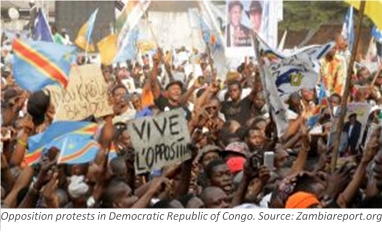 DRC also has one of the most expensive and long-lasting humanitarian crises, which may further deteriorate during the upcoming election period.
DRC also has one of the most expensive and long-lasting humanitarian crises, which may further deteriorate during the upcoming election period.
Violence in the context of elections in the DRC has historically been in direct response to political clashes and government repression. This is evident from reports of threats, intimidation, harassment, illegal detention, and disappearances of opposition leaders and activists. Additionally, there have been reports of severe restrictions on rights and freedoms of human rights defenders, journalists, and other media personnel relating to public affairs and political activity. These restrictions, acts, and incidents severely disrupt any democratic, transparent, and fair elections and, furthermore, limit civil society space.
According to a recent report by the UN High Commissioner for Human Rights, civilians have been hindered by authorities in the exercise of their rights to freedom of expression and opinion, demonstration, and peaceful assembly or association, especially in the form of protests and demonstrations organised by the opposition. In the report, the UN Joint Human Rights Office in the DRC documented 2,252 victims, including 103 women, of arbitrary arrests and other violations of the right to liberty and security. At the time of the report, at least 143 political prisoners and prisoners of conscience, including 12 women, were still in detention.
Regrettably GICJ notes that efforts to reduce political clashes and tensions in this context have been lacking. There is much concern as to whether the upcoming elections will be surrounded by violent conflict as has been the case in the past. To protect civilians' participation during the December 2018 elections GICJ calls on the international community to provide technical and logistical support to help secure free and fair elections in DRC and to provide human rights education and training to authorities and police to protect civilians' right to freedom of association and peaceful assembly.
Iran
Respect for human rights in Iran continues to deteriorate. According to the latest report from the United Nations, the human rights situation in the Islamic Republic of Iran is worrying. The nature and character of the Iranian regime’s human rights abuses are diverse and multi-dimensional. The civil and political rights, freedom of expression and opinion, freedom of association and assembly, freedom of press, the plights of dual and foreign citizens, women’s rights and the rights of ethnic and religious minorities are key issues that need immediate attention. Authorities in the security apparatus and Iran’s judiciary continue to target journalists, online media activists, and human rights defenders in an ongoing crackdown, in blatant disregard of international and domestic legal standards. The death penalty is used frequently, with thousands of people currently sentenced to death and hundreds executed every year. Despite assurances from the Government, improvements are either not forthcoming or are being implemented very slowly.
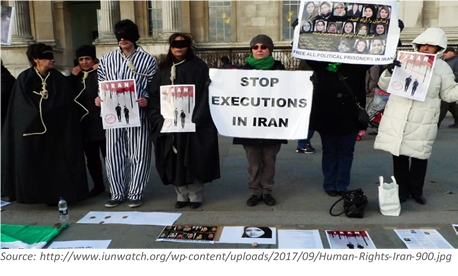 Geneva International Centre for Justice urges the international community to exert pressure over the Iranian regime to stop systematically violating international law and international humanitarian law (including forced displacement, arbitrary detentions, torture in prisons, construction of dams, violence perpetrated during the protests, and the list goes on). Constitutional law should also be reformed to incorporate the protection of ethnic and religious minorities in the country, not only in terms of ensuring their safety but also to guarantee them opportunities equal to the Persian Iranians, especially with regards to the education sector and in the workplace. Furthermore, Iran should immediately ban arbitrary detentions and torture within its penal system. The country must also ensure the protection of migrants in the country and guarantee them with equal and fair rights, free from any form of harm and discrimination. GICJ expresses its concern for the growing interference of Iran in the Arab region and for the lack of accountability for the human rights violations endured by ethnic and religious minorities in the country. While Iran should respect international humanitarian and human rights law both at home and abroad, the international community should stop prioritizing strategic and economic interest and ensure that the Iranian government acts in a transparent and responsible manner to protect human rights.
Geneva International Centre for Justice urges the international community to exert pressure over the Iranian regime to stop systematically violating international law and international humanitarian law (including forced displacement, arbitrary detentions, torture in prisons, construction of dams, violence perpetrated during the protests, and the list goes on). Constitutional law should also be reformed to incorporate the protection of ethnic and religious minorities in the country, not only in terms of ensuring their safety but also to guarantee them opportunities equal to the Persian Iranians, especially with regards to the education sector and in the workplace. Furthermore, Iran should immediately ban arbitrary detentions and torture within its penal system. The country must also ensure the protection of migrants in the country and guarantee them with equal and fair rights, free from any form of harm and discrimination. GICJ expresses its concern for the growing interference of Iran in the Arab region and for the lack of accountability for the human rights violations endured by ethnic and religious minorities in the country. While Iran should respect international humanitarian and human rights law both at home and abroad, the international community should stop prioritizing strategic and economic interest and ensure that the Iranian government acts in a transparent and responsible manner to protect human rights.
Iraq
Iraq is a country in crisis. The crisis was initiated by the international community, from the crippling sanctions in 1990 to the illegal U.S.-led invasion in 2003, and has been perpetuated by its own political leadership since 2005. The international community bears particular responsibility for addressing this crisis due to its role in causing it, yet it repeatedly fails to pay any significant attention to the dramatic suffering of tens of millions of Iraqi citizens. How can such a crisis continue without any foreseeable solution? How can the Iraqi government continue to subject so many of its citizens to unspeakable human rights abuses?
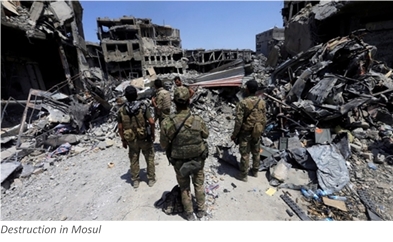 The US-led invasion in 2003 and the subsequent occupation resulted in the widespread devastation of much of the nation. More significantly, it led to the total collapse of the Iraqi state, creating a power vacuum that allowed for the rise of extremist groups and terrorism. Between Al Qaeda and Daesh in particular, Iraq was the scene of horrific terrorist acts for over a decade. Just since 2014, some of its major cities, such as Mosul, Tikrit, Amerli, Ramadi and Fallujah, have been almost completely destroyed in the fighting to rid Iraq of Daesh.
The US-led invasion in 2003 and the subsequent occupation resulted in the widespread devastation of much of the nation. More significantly, it led to the total collapse of the Iraqi state, creating a power vacuum that allowed for the rise of extremist groups and terrorism. Between Al Qaeda and Daesh in particular, Iraq was the scene of horrific terrorist acts for over a decade. Just since 2014, some of its major cities, such as Mosul, Tikrit, Amerli, Ramadi and Fallujah, have been almost completely destroyed in the fighting to rid Iraq of Daesh.
But the campaign against terrorism has been used as a pretext by the Iraqi government itself to seek reprisals against those who criticize it and to persecute various minority populations. After the 2003 invasion, the government was reconfigured to allocate power on the basis of ethnicity and family association. This sectarian governance structure is reflected in a broader government attitude favouring certain families and ethnic and political groups in power in Iraq. As a result, the Iraqi security forces and their affiliated militias have conducted campaigns against Iraqi citizens based on sectarian affiliations. They have looted, burned, and destroyed private and public buildings, and, more appallingly, they have perpetrated arbitrary arrests, torture, extrajudicial killings and enforced disappearances against civilians. GICJ has repeatedly documented and reported on a host of such occurrences. One example is a 2016 situation, reported by GICJ to the UN High Commissioner for Human Rights, where 643 persons were kidnapped in Saqlawiya by official militias. The government continues to claim it has no knowledge of the disappeared persons and takes no action to recover them or learn of their whereabouts.
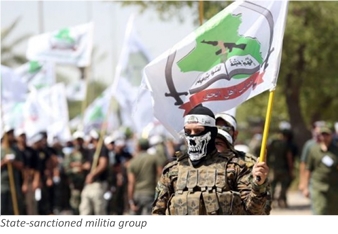 Another consequence of the devastating 2003 war and subsequent subversion of the previous political and social system is that the Iraqi judiciary is today among the most corrupt and least independent in the world. Judges are often in the pocket of either central government politicians or local militias and dispense “justice” according to the desire of the group in charge. Another problem is the lack of proper criminal procedures and prosecution, which presumes guilt, uses questionable evidence, conducts trials behind closed doors, and imposes the death penalty even for minor alleged offenses. A major example of this was Iraq’s prosecution and execution of individuals in connection to the Camp Speicher massacre in a trial that was widely criticized. People who were not connected to the massacre were sentenced and executed in a perversion of criminal justice; this was an act of revenge against persons based on their ethnicity.
Another consequence of the devastating 2003 war and subsequent subversion of the previous political and social system is that the Iraqi judiciary is today among the most corrupt and least independent in the world. Judges are often in the pocket of either central government politicians or local militias and dispense “justice” according to the desire of the group in charge. Another problem is the lack of proper criminal procedures and prosecution, which presumes guilt, uses questionable evidence, conducts trials behind closed doors, and imposes the death penalty even for minor alleged offenses. A major example of this was Iraq’s prosecution and execution of individuals in connection to the Camp Speicher massacre in a trial that was widely criticized. People who were not connected to the massacre were sentenced and executed in a perversion of criminal justice; this was an act of revenge against persons based on their ethnicity.
On this international celebration of Human Rights Day, GICJ calls on the international community to remember the victims of the Iraq crisis whose human rights have been subjected to continuous violation by a host of actors. The human rights of us all are at risk so long as we allow a situation like the Iraqi crisis to persist. The UN and its members must take the actions necessary to bring an end to the horrific conditions in Iraq and end impunity by bringing the many perpetrators of human rights violations to justice.
Myanmar
The humanitarian situation is becoming ever more severe day by day in the Rakhine state of Myanmar with atrocities being committed against the Rohingyas, a Muslim minority population, in the form of torture, killing, sexual violence, enforced disappearance, forced displacement, blockage of humanitarian assistance, denial of citizenship and destruction of holy places. With the increase in human rights abuses and violence, the refugee crisis hit a peak when around 7 million Rohingyas fled to Bangladesh by October 2017. In January 2018, the Governments of Bangladesh and Myanmar signed an agreement to allow the physical repatriation of Rohingya Refugees. In June 2018, the Tripartite agreement between the Government of Myanmar, United Nations High Commissioner for Refugees (UNHCR), and United Nations Development Programme entered into force. Despite this agreement, the Rohingyas are not yet able to return to Myanmar because the Government has failed to dismantle the discriminatory laws, policies and practices against them which makes it impossible for the refugees to return to their homes safely and with dignity.
Geneva International Centre for Justice has continuously voiced its concern over the situation of the Rohingya refugees. The human rights violations committed in Myanmar amount to genocide against the Rohingya people, crimes against humanity and war crimes, and justify the prosecution of all those responsible for ordering and carryout out such horrific acts. 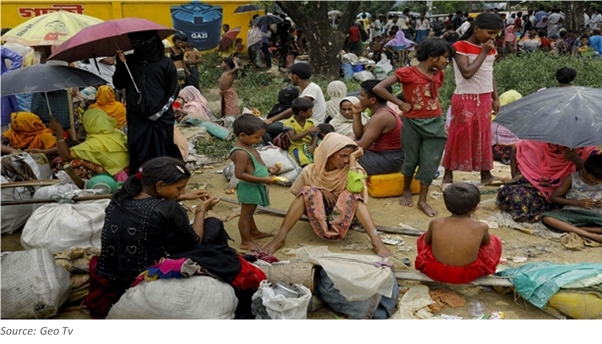 On multiple occasions, GICJ has called the attention of the Human Rights Council and the international community to forced repatriation of refugees and articulated its concern over the long-standing denial of citizenship to the members of the Rohingya minority. GICJ once again recommends that the Government of Myanmar dismantle its discriminatory laws, policies and practices against the Rohingyas, work with the UN Fact-Finding Mission and allow access to Rakhine State for the UNHCR, the Special Rapporteur, and the Commission on Inquiry. Moreover, GICJ calls upon the international community to help put an end to the atrocities committed against the Rohingyas by supporting the investigation and prosecution of those responsible for the terrible atrocities as recommended by the Independent International Fact-Finding Mission on Myanmar.
On multiple occasions, GICJ has called the attention of the Human Rights Council and the international community to forced repatriation of refugees and articulated its concern over the long-standing denial of citizenship to the members of the Rohingya minority. GICJ once again recommends that the Government of Myanmar dismantle its discriminatory laws, policies and practices against the Rohingyas, work with the UN Fact-Finding Mission and allow access to Rakhine State for the UNHCR, the Special Rapporteur, and the Commission on Inquiry. Moreover, GICJ calls upon the international community to help put an end to the atrocities committed against the Rohingyas by supporting the investigation and prosecution of those responsible for the terrible atrocities as recommended by the Independent International Fact-Finding Mission on Myanmar.
Palestine
The question of Palestine remains unresolved and the Palestinians have yet to attain their inalienable rights as defined by the United Nations General Assembly in its resolutions. These comprise, mainly, the right to self-determination without external interference, the right to national independence and sovereignty, and the right to return to their homes and property. Palestinians have paid an incredibly heavy price due to Israel’s ongoing occupation and racist policies instilled against them. 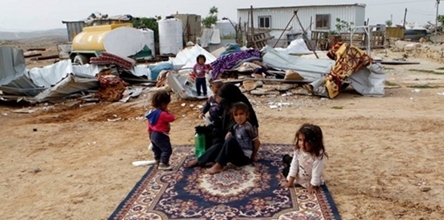 Despite all resolutions adopted by UN bodies over the past 70 years, Israel continues to expand its illegal settlements and to build a separation wall contrary to the International Court of Justice’s Advisory Opinion of 9 July 2004. It further carries on with a blockade of the Gaza Strip and with treatment of Palestinians living under its jurisdiction as third-class citizens, and uses excessive force by its police forces against demonstrators without hesitation. As shown by recent and ongoing demolitions of houses in small Bedouin villages in South Hebron Hills and the adoption of racist legislation, such as the New Nation State Law, the Palestinian situation continues to deteriorate.
Despite all resolutions adopted by UN bodies over the past 70 years, Israel continues to expand its illegal settlements and to build a separation wall contrary to the International Court of Justice’s Advisory Opinion of 9 July 2004. It further carries on with a blockade of the Gaza Strip and with treatment of Palestinians living under its jurisdiction as third-class citizens, and uses excessive force by its police forces against demonstrators without hesitation. As shown by recent and ongoing demolitions of houses in small Bedouin villages in South Hebron Hills and the adoption of racist legislation, such as the New Nation State Law, the Palestinian situation continues to deteriorate.
Despite all efforts by the international community to halt the relocation of the US Embassy from Tel-Aviv to Jerusalem, this relocation took place on 14 May 2017. To choose this date as the day for the official opening of the Embassy shows a complete lack of respect and empathy towards the plight of the Palestinian people, who honour the more than 700,000 Palestinians who had fled or had been expelled from their homes in the 1948 war on 15 May, the al-Nakba (catastrophe). Nevertheless, the US has recognized Jerusalem as the official capital of Israel and thus further distanced Palestine’s connection to the city in direct violation of several UN resolutions. As a result, the US is no longer an honest peace broker in the Israel/Palestine conflict. The current situation further undermines the rights of the Palestinian population and prolongs the process of peaceful and just resolution.
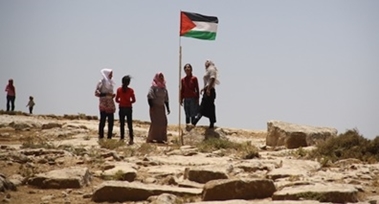 Geneva International Centre for Justice calls on the international community to exert pressure on the Israeli authorities to suspend the construction of the separation wall and the expansion of illegal settlements in the occupied territories, to stop any discriminatory and apartheid policies and to comply with its international obligations to respect the right to self-determination of the Palestinian people. In addition, GICJ reiterates that Israel must take the necessary measures to guarantee to all displaced Palestinians the right to return to their homes and ensure compensation. Furthermore, GICJ calls upon relevant UN bodies to open an urgent investigation into all Israeli violations in Gaza, East Jerusalem and the West Bank in order to hold Israel accountable for its actions. Finally, GICJ calls upon the international community to provide assistance and support to a peaceful and just solution to the Israeli-Palestinian dispute.
Geneva International Centre for Justice calls on the international community to exert pressure on the Israeli authorities to suspend the construction of the separation wall and the expansion of illegal settlements in the occupied territories, to stop any discriminatory and apartheid policies and to comply with its international obligations to respect the right to self-determination of the Palestinian people. In addition, GICJ reiterates that Israel must take the necessary measures to guarantee to all displaced Palestinians the right to return to their homes and ensure compensation. Furthermore, GICJ calls upon relevant UN bodies to open an urgent investigation into all Israeli violations in Gaza, East Jerusalem and the West Bank in order to hold Israel accountable for its actions. Finally, GICJ calls upon the international community to provide assistance and support to a peaceful and just solution to the Israeli-Palestinian dispute.
South Sudan
This year South Sudan once again topped the global list of violence against humanitarian operations. For the third straight year South Sudan is considered the most dangerous country for aid workers. Major attacks were reported in Aid Worker Security Report, 2018 which includes killings by gunfire, aid worker kidnappings, and also increased detention of aid workers since 2015. Since the outbreak of the conflict over 100 aid workers have lost their lives and South Sudanese staff are at the highest risk. This is of serious concern especially for civilians who are in desperate need of humanitarian aid. Communities are on the brink of starvation, many are in need of medicine, and livelihoods of many more have been destroyed by the warring parties who are responsible for the famines of 2017 and 2018. Worse still, food is used as a weapon of war increasing risks of famine and food shortage in the near future where already over 5 million people are food insecure.

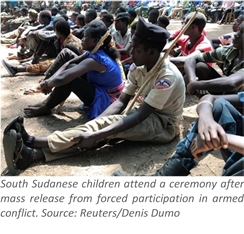 Another major concern is child soldiers. Over 19,000 children have been recruited by the warring parties, government security forces, and other armed groups since the beginning of the civil war in 2015. Over 900 child soldiers, including girls, were released earlier this year from the ranks of armed groups in South Sudan. The released children are undergoing social reintegration processes and are receiving vocational training. While this is a positive development, much needed technical and financial assistance is needed to ensure their healing and well-being. GICJ strongly recommends that the government, social services, and communities ensure that the released children have access to mental and physical therapy to heal traumatic wounds and that human rights education is integrated in their reintegration processes.
Another major concern is child soldiers. Over 19,000 children have been recruited by the warring parties, government security forces, and other armed groups since the beginning of the civil war in 2015. Over 900 child soldiers, including girls, were released earlier this year from the ranks of armed groups in South Sudan. The released children are undergoing social reintegration processes and are receiving vocational training. While this is a positive development, much needed technical and financial assistance is needed to ensure their healing and well-being. GICJ strongly recommends that the government, social services, and communities ensure that the released children have access to mental and physical therapy to heal traumatic wounds and that human rights education is integrated in their reintegration processes.
Geneva International Centre for Justice is cautious about the new peace agreement signed in September 2018 especially considering the previous two peace deals were not respected or adhered to. GICJ is especially concerned with the most vulnerable people of South Sudan whose plight may worsen due to the grave humanitarian situation and the many children who will suffer high risks of malnutrition. In light of this GICJ calls on the government of South Sudan to ensure the safety and protection of aid personnel, calls on the international community to guarantee that the new Peace Deal is centred around the well-being of South Sudanese population, and urges the international community and all relevant UN bodies to step up humanitarian aid operations in South Sudan.
Syria
Since the Syrian conflict began in 2011, more than 400,000 people have died, 5 million have sought refuge abroad and over 6 million people are internally displaced, according to UN agencies. More recently, as pro-Government forces moved to recapture large swathes of territory from armed groups and terrorist organisations, over one million Syrian men, women, and children were displaced with most now living in dire conditions. Displaced Syrians face myriad hardships and challenges to their livelihoods, including the lack of access to sufficient food, water, medical services, basic sanitation facilities, and adequate accommodation.
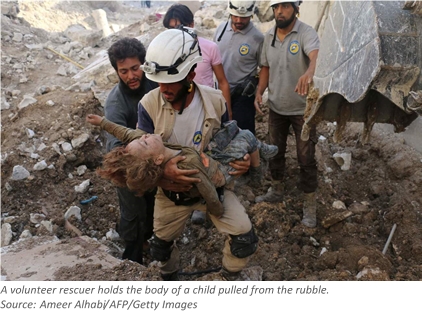 The Syrian people have been victims of human rights violations by its own government and allied forces, as well as by opposition and terrorist groups. War crimes and other violations of international humanitarian law have been committed, including indiscriminate and direct attacks on civilians, homes, hospitals and medical facilities as they maintained lengthy sieges of predominately civilian areas. The Syrian government has been accused of launching numerous chemical weapons attacks on civilians in opposition-held areas. With Russia and Iran’s support, the Syrian government has conducted deliberate and indiscriminate attacks against civilians and civilian infrastructure, withheld humanitarian aid, employed starvation as a war tactic, and forcibly displaced Syrians in contravention of international law. The government and armed opposition groups also negotiated four so-called reconciliation agreements between August 2016 and March 2017 that led to the forced displacement of thousands of residents from five besieged areas: Daraya, eastern Aleppo city, al-Waer neighbourhood in the city of Homs, and the towns of Kefraya and Foua.
The Syrian people have been victims of human rights violations by its own government and allied forces, as well as by opposition and terrorist groups. War crimes and other violations of international humanitarian law have been committed, including indiscriminate and direct attacks on civilians, homes, hospitals and medical facilities as they maintained lengthy sieges of predominately civilian areas. The Syrian government has been accused of launching numerous chemical weapons attacks on civilians in opposition-held areas. With Russia and Iran’s support, the Syrian government has conducted deliberate and indiscriminate attacks against civilians and civilian infrastructure, withheld humanitarian aid, employed starvation as a war tactic, and forcibly displaced Syrians in contravention of international law. The government and armed opposition groups also negotiated four so-called reconciliation agreements between August 2016 and March 2017 that led to the forced displacement of thousands of residents from five besieged areas: Daraya, eastern Aleppo city, al-Waer neighbourhood in the city of Homs, and the towns of Kefraya and Foua.
GICJ calls for an investigation of all alleged violations of human rights since March 2011 in the Syrian Arab Republic. We call on the international community to provide financial support to enable host countries to respond to the growing humanitarian needs of Syrian refugees and to pressure the Syrian government to allow humanitarian actors to safely access hard-to-reach areas. We also call on the Syrian Government to release all arbitrarily detained persons and to end the practice of besieging civilian areas.
Yemen
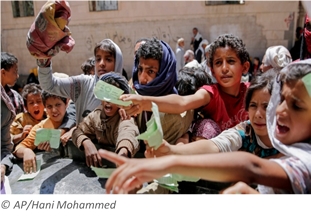 The people of Yemen are currently suffering through one of the worst humanitarian crises of our time. Yemen is in a state of civil war, a conflict that stems from the political ambitions of the Houthi militia and has enveloped the country since the Houthi militia took control of the capital in 2014. A year ago the crisis is was already so severe that more than 60% of Yemenis were food insecure and 16 million lacked safe drinking water. Almost 75% of the population survives on less than USD 100 per month. The unraveling of government services and virtual economic collapse due to the conflict has resulted in shortages of food, water, sanitation and medicine such that a majority of Yemenis now face destitution, famine, and cholera.
The people of Yemen are currently suffering through one of the worst humanitarian crises of our time. Yemen is in a state of civil war, a conflict that stems from the political ambitions of the Houthi militia and has enveloped the country since the Houthi militia took control of the capital in 2014. A year ago the crisis is was already so severe that more than 60% of Yemenis were food insecure and 16 million lacked safe drinking water. Almost 75% of the population survives on less than USD 100 per month. The unraveling of government services and virtual economic collapse due to the conflict has resulted in shortages of food, water, sanitation and medicine such that a majority of Yemenis now face destitution, famine, and cholera.
In addition to the broad humanitarian impact of the conflict, various parties to the conflict, especially the Houthi militia, have engaged in serious human rights abuses. The Houthi militia have placed land mines around cities and made extensive use of child soldiers. They have silenced criticism through arbitrary detention and have targeted the Baha’i community with prosecutions and death sentences. Many parties, including the Arab Coalition, have been accused of indiscriminate targeting of large impact weapons that has resulted in countless civilian casualties. These and many other human rights abuses need to end.
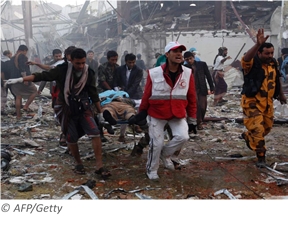 Through a series of resolutions, the UN Security Council has created a legal framework that empowers the international community to take the necessary actions that will help end the conflict. And still, the conflict rages on with an estimated 62,000 killed or injured by the end of 2017. GICJ joins with others in calling attention to the plight of the many victims of the humanitarian crisis and human rights violations in Yemen. Further, we call on the international community to utilize the power given to it by the Security Council to end the war. Only through peace can there be any hope of ending the suffering of Yemenis and achieving justice for the war’s many victims.
Through a series of resolutions, the UN Security Council has created a legal framework that empowers the international community to take the necessary actions that will help end the conflict. And still, the conflict rages on with an estimated 62,000 killed or injured by the end of 2017. GICJ joins with others in calling attention to the plight of the many victims of the humanitarian crisis and human rights violations in Yemen. Further, we call on the international community to utilize the power given to it by the Security Council to end the war. Only through peace can there be any hope of ending the suffering of Yemenis and achieving justice for the war’s many victims.
Conclusion
Despite the endorsement of the Universal Declaration of Human Rights in 1948 by the UN General Assembly, we as a global community have failed to protect people’s human rights across the globe. Grave human rights violations and abuses continue to haunt many people around the world, often due to their particular or vulnerable situation, and perpetrators of these crimes often enjoy impunity.
|
“As long as poverty, injustice and gross inequality persist in our world, none of us can truly rest.” Nelson Mandela |
While noting much progress in certain areas and regions, much more still needs to be done. GICJ remains especially concerned with those who are most susceptible to the gravest and most serious human rights violations and abuses – those who often lack the means or opportunities to voice their concerns. GICJ will always lend an ear to bring those unheard voices to the international community. GICJ also believes that an empowered and strong civil society is absolutely fundamental to the promotion and protection people’s human rights.
GICJ reiterates that human rights are inalienable, indivisible, interdependent and interrelated. On this special occasion GICJ appeals to all states to review and reflect on their own human rights situation as well as the overall state of human rights across the world. States have a distinct responsibility to protect fundamental freedoms and ensure that the entire population, especially the most vulnerable members of society, are ensured their human rights without any distinction. To this end, GICJ calls on all countries to adopt the ICCPR and the International Covenant on Economic, Social and Cultural Rights.
As we celebrate the 70th Anniversary of the UDHR, Geneva International Centre for Justice advocates for stronger efforts on the ground to effectively address human rights situations around the globe. The international community must find creative and effective solutions to prevent future atrocities and horrors from occurring. Finally, GICJ believes that education in all its forms together with opportunities for fellowship among peoples across the globe will bring new successes to the protection and promotion of our universal human rights.
#STANDUP4HUMANRIGHTS
#InternationalHumanRightsDay
|
Read online or download the full report. |
#gicj, #geneva4justice, #Iraq, #DRC, #CAR, #SouthSudan, #Iran, #Yemen, #USA, #Myanmar, #Syria, #Palestine, #Burundi, #Migration, #ModernSlavery, #CivilSociety, #ClimateChange, #Racism, #Geneva
International Days of Remembrance articles by GICJ:







